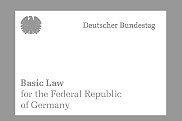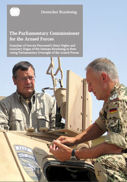Navigationpath: Homepage > German Bundestag
The Parliamentary Commissioner for the Armed Forces
Working on behalf of the Bundestag
The Parliamentary Commissioner for the Armed Forces is elected by the Members of the Bundestag in a secret ballot for a five-year term of office. The Commissioner is neither a Member of the Bundestag nor a civil servant - he occupies a special position.
The Commissioner works "to safeguard basic rights and to assist the Bundestag in exercising parliamentary oversight" over the armed forces, a task enshrined in the Basic Law (the German constitution).
The Commissioner"s exact tasks and powers are set out in the Act on the Parliamentary Commissioner for the Armed Forces. This law specifies two reasons in particular for the Commissioner to take action: upon instructions from the Bundestag or its Defence Committee, and due to circumstances which suggest a violation of the basic rights of a member of the armed forces or of the principles of Innere Führung (leadership and civic education).
Parliamentary scrutiny of the armed forces
The Commissioner is appointed to assist the Bundestag in exercising parliamentary scrutiny of the Bundeswehr. The Commissioner is thus subject to the instructions of the Bundestag and has clearly defined duties towards it.
For example, on the instructions of Parliament or its Defence Committee, the Commissioner must investigate critical incidents in the Bundeswehr and report on his findings.
In addition, the Commissioner must submit an annual report on his work. The Commissioner"s duties also include the obligation to be present in the Bundestag if requested by Parliament or the Defence Committee.
Guardian of basic rights and principles
Since the first Parliamentary Commissioner for the Armed Forces took up office in 1959, the Bundestag has issued no instructions and the Defence Committee has done so on only 25 occasions. The Commissioner therefore works primarily on his own initiative.
The Commissioner investigates incidents within the Bundeswehr which give rise to the suspicion that, for example, human dignity, freedom of opinion or the legal protection of service personnel have been unlawfully restricted.
The Commissioner"s attention can be drawn to special incidents which lead to investigations during visits to military units and through press reports, information from Members of the Bundestag or petitions from service personnel.
The right of service personnel to petition the Commissioner
The Commissioner has another important function, in addition to assisting Parliament in the scrutiny of the armed forces. He is the ombudsman of the armed forces and can thus be contacted directly and without going through official channels by every member of the armed forces, from private to general. Service personnel can bring to the attention of the Commissioner all matters which they feel reflect wrong or unfair treatment. Petitions can therefore cover the entire spectrum of everyday military routines, including official, social and personal problems.
Petitions need not be submitted by service personnel themselves. Comrades, elected spokespersons and family members can also contact the Commissioner on behalf of a member of the armed forces. The soldier concerned is then asked to give consent before the Commissioner takes action.
Powers
In order to carry out his constitutional tasks, the Parliamentary Commissioner for the Armed Forces has the power to request that information be provided and to make proposals. He has the right to scrutinise matters relating to the Federal Ministry of Defence and all of its subordinate agencies and personnel.
The Commissioner is also entitled to administrative assistance. Courts and administrative authorities of the Federation, the Länder and the municipalities are obliged to support the Commissioner in the conduct of necessary investigations.
Right to information
The Commissioner has the right to draw on various sources of information in his work.
He has the right to demand information and access to records from the Federal Minister of Defence and all subordinate agencies.
The Commissioner can conduct hearings of people who have submitted complaints, as well as witnesses.
The Commissioner may, at any time and without prior announcement, visit any units, headquarters, installations or administrative agencies of the Bundeswehr.
He can request reports on the exercise of disciplinary power in the Bundeswehr and attend criminal or disciplinary proceedings in court.
Right to make proposals and recommendations
If the Commissioner finds that there have been deficiencies or incorrect behaviour, he may request that the authorities responsible take measures to prevent future recurrences.
He can propose that criminal and disciplinary proceedings be initiated by referring a matter to the authority responsible.
The Commissioner"s proposals are not instructions or orders. However, his influence should not be underestimated. Experience has shown that the very existence of an independent commissioner to whom any member of the armed forces can have recourse has a positive effect on leadership behaviour.
Further Information
Contact
Der Wehrbeauftragte des Deutschen Bundestages
Platz der Republik 1
11011 Berlin
Germany
Tel.: +49 (0)30 227 38 100
Fax: +49 (0)30 227 38 283
IVBB-Tel.:
+49 (0)30 1818 38100
IVBB-Fax:
+49 (0)30 1818- 38283
Annual Report
-
2012 (54th Report) (pdf | 1.3 MB)
Information Material
-
Basic Law
-
The Parliamentary Commissioner for the Armed Forces









 Español
Español Русский
Русский Français
Français
